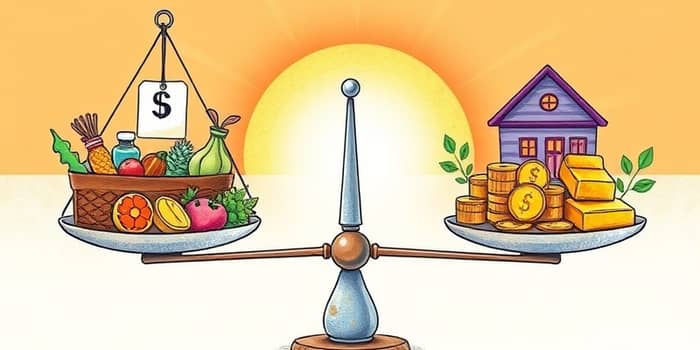
Inflation shapes every aspect of our financial lives, from morning coffee runs to long-term retirement plans.
As prices climb, each dollar stretches a bit less—making it crucial to understand the forces at play and how to adapt.
In this comprehensive guide, we explore the mechanics of inflation, its real-world effects on spending and saving, and the strategies you can use to stay ahead.
Inflation refers to the sustained rise in the average price level of goods and services, leading to a decline in your purchasing power.
Simply put, when inflation ticks up, each dollar buys fewer goods and services than before.
According to 2025 U.S. surveys, persistent expectations of rising costs have taken root: 51% of adults believe inflation will climb this year, while 65% rank it as their dominant financial concern.
Everyday needs—groceries, housing, healthcare—feel the pinch first.
Lower and moderate-income households, along with retirees on fixed incomes, bear the brunt of these increases.
When wage growth lags behind inflation, real income declines and budgets tighten further.
As general price levels rise, so do the values of many physical assets—but the cost of borrowing also climbs.
Home values often appreciate in line with inflation, yet higher interest rates make mortgages more expensive and slow affordability.
Cash savings erode quickly if held in low-yield accounts, while fixed-rate debt burdens lighten when inflation outpaces the loan’s interest rate.
For example, if inflation runs at 3% and your mortgage carries a 5% rate, your real cost is roughly just 2%—a hidden benefit for borrowers.
Building an inflation-resilient portfolio starts with diversification.
While no single asset can guarantee protection, combining them can smooth returns and maintain purchasing power.
By focusing on diversify portfolios to hedge risk, investors position themselves to outpace inflation over the long term.
Adapting proactively can transform anxiety into opportunity.
Tracking spending in real time helps curb impulse purchases and preserves funds for essentials.
Upskilling—whether through online courses or professional certifications—boosts your earning potential and resilience.
Beyond tactics and numbers lies an emotional journey. Worry about inflation can be stressful for your peace of mind, but knowledge empowers action.
Financial discipline emerges from clear goals, routine check-ins, and adapting to changing conditions.
Leverage budgeting apps and seek advice from trusted financial professionals to refine your plan.
Inflation’s ripple effects touch every corner of your financial life, from daily groceries to retirement security.
By staying informed, adjusting budgets, and aligning investments with inflation-resistant assets, you turn uncertainty into a powerful catalyst for growth.
Your path to financial confidence begins with small, consistent steps: regular reviews, diversified holdings, and continuous learning.
As inflation ebbs and flows, an adaptable strategy ensures you remain in control—ready to thrive, not just survive.
References













